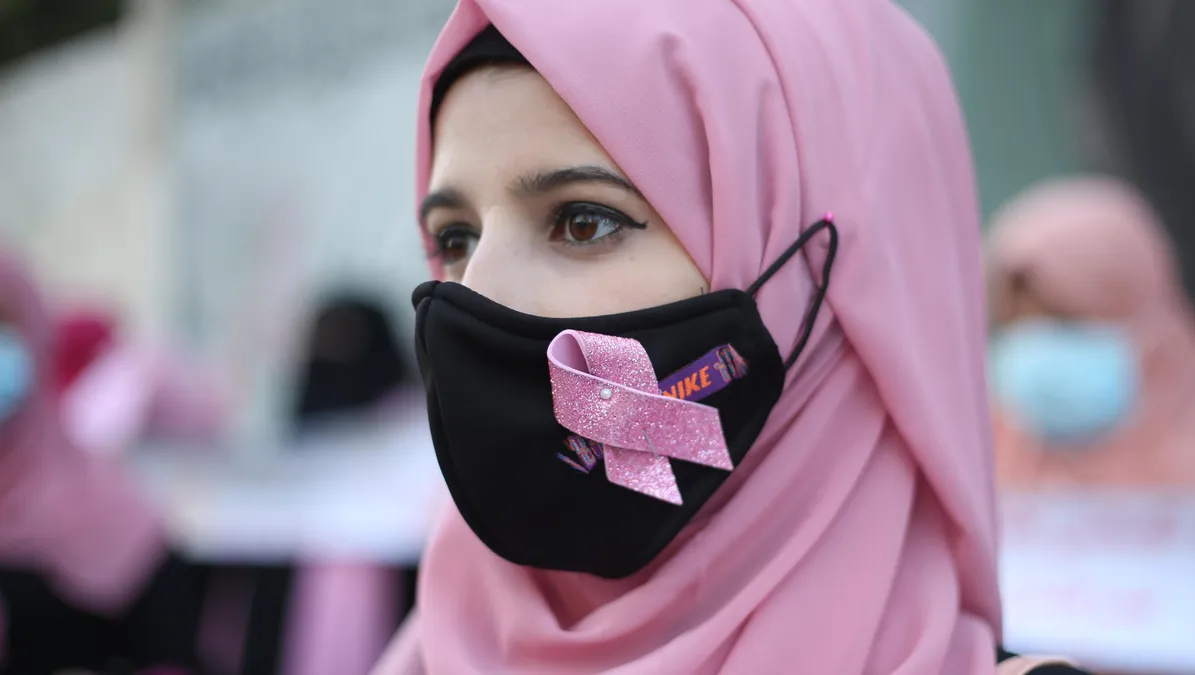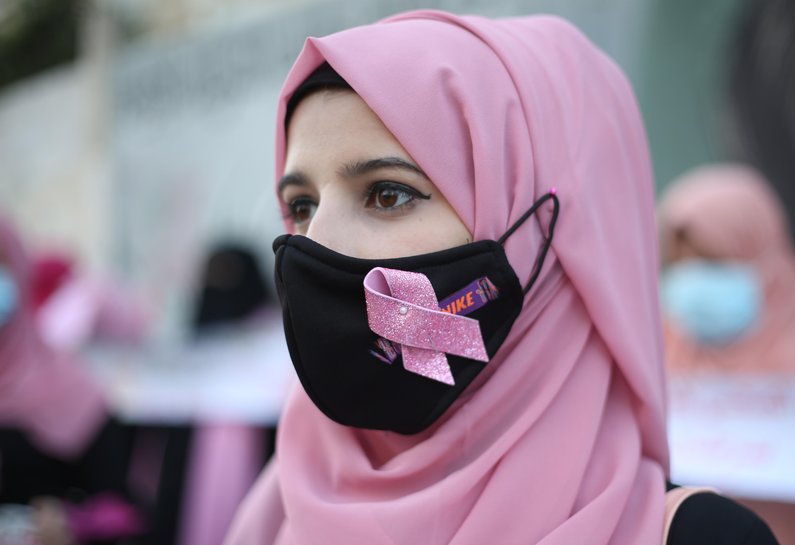A journey of despair and hope for one breast cancer survivor in Gaza
5 October 2022


Photo: A Palestinian woman takes part in an event to support breast cancer survivors in the southern Gaza city of Rafah. (Credit: Khaled Omar/Xinhua/Alamy Live News).
Ghalia has been living with breast cancer for almost three years. She began her journey of treatment in January 2020, after she felt pain in her breast and was advised by her younger sister Rania to get it checked out.
Recounting her complex journey of care, she described having to move between the different stages of diagnosis and treatment: “I went to a non-governmental clinic and after a clinical breast examination they referred me for a mammogram. I made an appointment at a private hospital, as I could not wait to get an appointment at the governmental hospital.”
“After the surgeons saw my mammogram report they told me I have a malignant mass in my breast and it should be removed with surgery. I had my first surgery to remove this mass, but surgeons found that they still needed to remove more of my breast and I had a second major surgery,” said Ghalia.
“I was then referred to the European Gaza Hospital for chemotherapy, but that was during the COVID-19 pandemic and the hospital was a dedicated COVID-19 hospital. Oncology services were transferred to the Palestine Red Crescent Society in Khan Younis, where I had eight chemotherapy sessions including my last in October 2021.”
Breast cancer accounted for 34.3% of all cancers among women in Gaza in 2021, and made up 13.3% of all cancer deaths between 2016 and 2020, according to the Palestinian Ministry of Health. Despite being one of most treatable types of cancers, Israel’s restrictions on Gaza, including its 15-year illegal closure and blockade, mean patients face barriers to care unlike anywhere else in the world.
Severe shortages of medical supplies and drugs, and Israel’s restrictions on freedom of movement that prevent patients from reaching available cancer services outside of Gaza, as well as limiting health professionals’ access to training, significantly weaken local breast cancer diagnostic and treatment pathways.
There are also no radiotherapy services in Gaza and certain chemotherapy treatments are unavailable locally. As a result, many patients must leave Gaza to access hospitals in the West Bank, in particular East Jerusalem, or abroad. But to travel to these care centres, patients must navigate an arduous and opaque application process to receive permission from the Israeli authorities. This procedure is characterised by frequent, arbitrary rejections and excessive delay.
Since 2017, MAP has been working to address barriers to breast cancer care through a combination of medical missions, training fellowships for Palestinian specialists in the UK and Jordan, procuring essential equipment and consumables, and supporting the development of systems of care and appropriate referral pathways. But the challenges remain significant and many women must still be referred outside of Gaza for treatment.
My permit was rejected but I did not give up and applied again and again. After receiving four rejections for my permit, I asked a human rights organisation for help.
After her chemotherapy, Ghalia was referred to Augusta Victoria Hospital, in occupied East Jerusalem, for radiotherapy – the last stop of her tumultuous journey. She applied for a permit in October 2021, but it was rejected.
“My permit was rejected but I did not give up and applied again and again. After receiving four rejections for my permit, I asked a human rights organisation for help. That was when I finally got my permit approved and travelled to Jerusalem in July 2022 to receive my first radiotherapy session. It was delayed for nine months,” said Ghalia. “I was always crying and wondering why I have been receiving rejections, while other people I know in Gaza have got their permits and completed their treatment.”
But it is not just patients who have to apply for permits to leave Gaza. Companions accompanying them on these stressful journeys must also apply. In July 2022, Israel approved just 34% of permit requests for companions seeking to accompany patients to treatment. Ghalia’s sister was denied a companion permit, so when Ghalia was finally allowed to travel to Jerusalem she had to do so on her own.
Once at Augusta Victoria Hospital, she had to go through a long list of medical investigations, laboratory tests and imaging (mammography and CT scans). Ghalia’s test results revealed that the malignant mass in her breast was still there, so she had to get her whole breast removed with a mastectomy before she could receive any radiotherapy.
Doctors told Ghalia that an expert breast surgery team would be visiting the hospital in three months and that they could conduct the surgery she needs. But thinking about her three children back home, Ghalia decided not to wait and returned to Gaza for the mastectomy. She has now gone through three rounds of surgery.
After her last surgery, Ghalia applied again for permits for her and her sister to travel to Jerusalem for her radiotherapy. She was thankful that both were approved and she received her first radiotherapy session, out of 16 in total, in August 2022. But for each radiotherapy session, Ghalia and her sister must apply for a new permits. She is now waiting for approval to attend her second radiotherapy session.
Ghalia’s life would have been much easier if radiotherapy was available in Gaza and if she did not have to apply for a permit to reach her treatment. As an occupying power, Israel is obligated to ensure that patients in Gaza have unimpeded access to medical care.
This is why, as well as supporting the development of cancer services inside Gaza, Medical Aid for Palestinians (MAP) is campaigning for an end to Israel’s closure of Gaza and collective punishment of its population, including the many patients locked away from care.
From pressuring Israel to lift its discriminatory travel restrictions, to supporting the development of services inside Gaza, the UK can and must do more to ensure women like Ghalia can access the vital care they need.
Please email your MP, and ask them to call on the UK government to take action today.
*Name changed to protect identity.